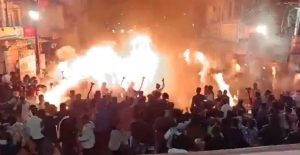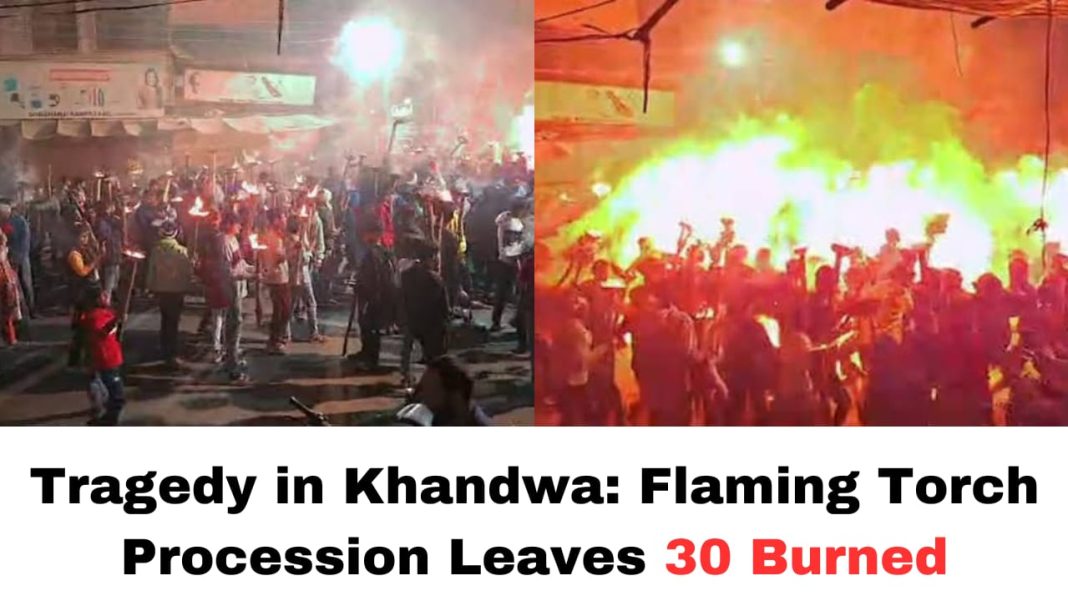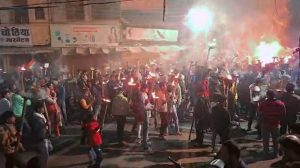Digital News Guru Madhya Pradesh Desk:
Tragedy in Khandwa: Flaming Torch Procession Leaves 30 Burned !
On November 28, 2024, a solemn procession in Khandwa, Madhya Pradesh, turned tragic as over 30 people suffered burn injuries. The event, organized as a Mashal (torch) rally by the Veer Yuva Manch, aimed to commemorate the 26/11 Mumbai terror attack martyrs and raise awareness against terrorism. However, inadequate safety measures during the handling of flaming torches led to a catastrophic fire that left participants and onlookers scrambling for safety.
Sequence of Events: From Tribute to Chaos
The rally, held at the bustling Ghantaghar Chowk in Khandwa, attracted a large number of participants, including men, women, and children. Many carried flaming torches to signify unity and resilience. According to reports, the incident occurred when a flammable liquid used to light the torches spilled onto the ground. Sparks from the torches ignited the liquid, creating an inferno that quickly engulfed participants standing nearby.

Eyewitnesses described scenes of panic as flames spread rapidly. Several individuals attempted to extinguish the fire with whatever resources were available, but the intensity of the blaze overwhelmed them. Many of the injured sustained burns on their hands and faces while attempting to control the situation or help others escape.
Injuries and Medical Response
Out of the 30 injured, 12 required immediate hospitalization due to the severity of their burns. Medical professionals worked tirelessly to stabilize the victims. Despite the chaos, authorities confirmed that there were no fatalities as of the latest updates, though some individuals remain in critical condition.
Safety Oversight: A Key Concern
The rally had reportedly received official clearance, and local leaders from the Bharatiya Janata Party (BJP) were present during the event. However, the incident has raised serious questions about safety preparedness. Organizers apparently did not enforce adequate safety protocols, such as ensuring the proper handling of flammable materials or having fire extinguishers readily available.
This lapse highlights a troubling pattern of insufficient regulation during large public gatherings involving hazardous materials. Many have criticized the administration for failing to anticipate risks associated with such events, especially in crowded areas like Ghantaghar Chowk.

Public Outcry and Demands for Reform
The incident has sparked outrage on social media and within the local community. Many have demanded accountability from both the organizers and the administration. Activists and safety experts argue that the tragedy was entirely preventable, had basic precautions been in place. Suggestions include:
- Mandating fire safety equipment, such as extinguishers, at all events involving open flames.
- Training volunteers and organizers in emergency response protocols.
- Reassessing the suitability of conducting fire-based processions in densely populated areas.
The tragedy has also prompted calls for stricter guidelines and enforcement of regulations governing public events.
Broader Implications: A Pattern of Neglect?
This incident is not an isolated case. India has a history of accidents at public events due to poor planning and oversight. From stampedes at religious gatherings to fire outbreaks at festivals, such tragedies underline the need for systemic reforms.
The Khandwa tragedy serves as a poignant reminder of the importance of prioritizing safety over symbolism. While the Mashal rally intended to honor martyrs and promote a message of resilience, the lack of precautions undermined its purpose, leaving families and communities grieving.
Moving Forward: Lessons from Khandwa
As Khandwa begins the process of recovery, the focus shifts to ensuring that such incidents do not recur. Authorities must adopt a proactive approach to safety, including:
- Comprehensive Risk Assessments: Identifying potential hazards before granting permissions for public events.
- Mandatory Safety Audits: Ensuring organizers comply with all safety requirements, especially for events involving fire or large crowds.
- Emergency Preparedness: Training personnel and equipping them with tools to handle unforeseen crises.
By implementing these measures, India can honor the memory of events like the 26/11 attacks without endangering the lives of participants and onlookers.
Conclusion
The tragic events in Khandwa have cast a shadow over what was meant to be a solemn tribute. As the injured recover and investigations proceed, the incident serves as a stark warning about the dangers of neglecting safety. It is an opportunity for policymakers, event organizers, and the public to reflect and act, ensuring that future commemorations are both meaningful and secure. Only by learning from such tragedies can we truly honor the resilience and sacrifice of those we seek to remember.
You May Also Read: Sanchi: The Ancient City of Stupas and the Birthplace of Buddhist Art









